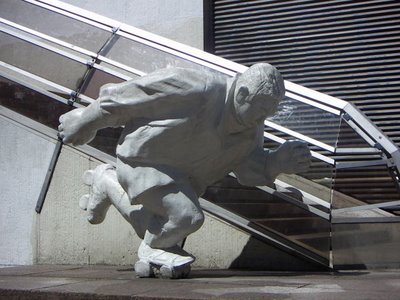off the harness

It Is Not Mean... continues to pick at Dave Douglas's "crazy experimental freedom" interview (Not Mean's initial salvos are in the comments to that post).
Not Mean's questions about Daniel Carter liking a James Taylor song ("Did he hear what every other James Taylor fan heard? Did he hear something entirely different?") reminds me of a passage in a Stanley Crouch article about Fred Astaire and (tangentially) Louis Armstrong:
Astaire's innovations came along at the right time, just as Armstrong's had, and were charismatic for exactly the same reasons: Astaire was incomparable. There may have been greater tap dancers than Astaire in some Harlem somewhere in America. Or, Astaire may have been right when he supposedly said that Bill Robinson was the greatest dancer he had ever seen. Even so, we can't be sure: What a genius sees when experiencing someone else working within his idiom is usually not only what is going on but what is implied.Hearing what is not there, or only hinted at, is one way of getting innovative ideas. That's why I can't agree with Not Mean's damning final paragraph.
Adding a "harness" to a music, imposing a "sense of structure"--this is all well good, but it is the opposite of the lesson all that "crazy experimental freedom" taught.If the CEF developed the freedom implied in earlier music, developing the structure implied in the CEF seems logical. Listening to, for example, the Wildflowers compilation, it is clear that the CEF fighters didn't wait around for Dave Douglas to arrive to start doing precisely that. But I may be misunderestimating the meaning of "To be judicious is to be weak."
+
At one time I loved Cecil Taylor because he crossed the idioms of classical and jazz. In response to Thelonious Monk I was very open-minded. I didn’t want to play that way but I was fascinated by the freedom. But when jazz became angry it lost so much of its appeal. The music of protest is one-dimensional. A self-indulgent attitude crept in, musicians making music only for themselves.Is my response to this too foregone a conclusion? Perhaps, but I'll say it anyway.
- pianist Peter Nero in "Strung Out on Strings" [via Stochasticactus]
I see jazz as having always been partially about protest against the condition of subhumanity, of de-intellectualisation, of limited options, of obscured African roots and so on. Simply, if "Strange Fruit" (talk about anger!) was the first protest song, then how is the music of protest "one-dimensional?" Did Louis Armstong not understand the complexity of him jovially singing "What did I do/To be so black and blue?" And wasn't part of the 60s-70s avant-garde busily engaging with contemporary dance rhythms?
|